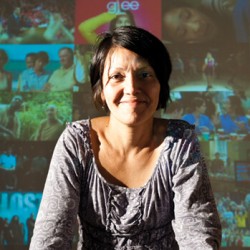Practical Magic
Fans of Harry Potter and other pop-culture touchstones transform into activists.
As the public’s faith in government and traditional political institutions crumbles, younger generations are taking cues from fictional wizards and TV vampires to support the issues or causes they believe in.
This phenomenon caught the attention of Ashley Hinck, a PhD candidate in communication arts at UW–Madison. Her master’s thesis focused on the Harry Potter Alliance, a nonprofit organization with eighty-five chapters around the world that uses parallels from the popular books by J.K. Rowling for activism in the real world. Since 2005, the alliance has organized more than twenty-five social-justice campaigns on issues such as same-sex marriage, independent media, fair trade, and ending genocide.
Hinck first became aware of the group when her best friend from high school, who was a “super fan,” dragged her along to a Harry Potter convention. At the time, she was an undergraduate studying communication, focusing on persuasion and social movements — yet she didn’t see the work of the Harry Potter Alliance reflected in what she was learning.
“I thought, ‘Why is no one talking about this?’ ” she says.
Members of the alliance engage in typical democratic activities: voting, signing petitions, and contacting their representatives. But they’re taking these steps because of themes and lessons they find in Harry Potter books, not because of a political party or a traditional interest group.
The alliance pushed Congress to take action on Darfur. “When the genocide wasn’t really being talked about, they pushed that a little bit further, and then it became a little more mainstream,” Hinck says. Members also worked on marriage-equality campaigns in Maine, Massachusetts, and Rhode Island. As soon as the Harry Potter Alliance joined forces with Mass Equality, a nonprofit that supports same-sex marriage, the number of phone calls they made in one day grew by 1,200 percent, she says.
But activism is happening among fans beyond those who love Quidditch and Dumbledore.
“I have more case studies than I know what to do with,” Hinck says. She studies a range of “fandoms,” from underground and niche to more mainstream. Followers of a YouTube channel called VlogBrothers branded themselves “Nerdfighters” and have loaned nearly $3 million to people in developing countries through the website Kiva.org. And young fans of the TV show The Vampire Diaries are taking part in environmental activism through a charity established by one of the show’s stars, Ian Somerhalder.
“I’m working against the idea that super fans are weird, crazy loners. For these fans, it is very serious, and it has really important implications for who they are as political subjects, as citizens. I think that’s the really exciting part.”
Ashley Hinck
“I wanted to make sure that this wasn’t just about ‘nerd culture,’ that this is fandom really across the board, that fandom itself has huge potential,” Hinck says.
One prime example: Nebraska head football coach Tom Osborne, who motivated Cornhusker fans to support mentoring by donating money and volunteering to mentor youth in local schools.
Hinck’s research belies any perception that fans of pop culture are losers who don’t do anything. “I’m working against the idea that super fans are weird, crazy loners. For these fans, it is very serious, and it has really important implications for who they are as political subjects, as citizens. I think that’s the really exciting part,” she says. Fandom has shifted during the past twenty years, becoming more mainstream and accepted, as the Internet and social media have made it easier than ever for fans to connect with one another and organize.
Last year, the Harry Potter Alliance launched a campaign, Odds in our Favor, that was tied to the release of the second movie based on the Hunger Games book series. The campaign was aimed at making sure that economic inequality — the core of the trilogy’s story — wasn’t lost in the glossy marketing campaign for the film Catching Fire, which had product tie-ins for consumer items, such as a line of Cover Girl cosmetics. Fans posted photos of themselves on social media doing the movie’s three-finger salute in response to ads and posts about the movie.
While that might seem trivial, Hinck says such activities are powerful for fans.
“Their identity is really at stake in these media places. So as soon as you say, ‘I stand for economic equality … I think this should change,’ I think that’s really significant in a young person’s life. I don’t think we should downplay what it means to change your Facebook avatar,” she says. “If you think about the courage it takes to say, ‘This is my stake. This is my position on a political issue,’ then it becomes meaningful.”
Jenny Price ’96 declared political science as her major after taking one class on American government at UW–Madison.
Published in the Fall 2014 issue




Comments
No comments posted yet.